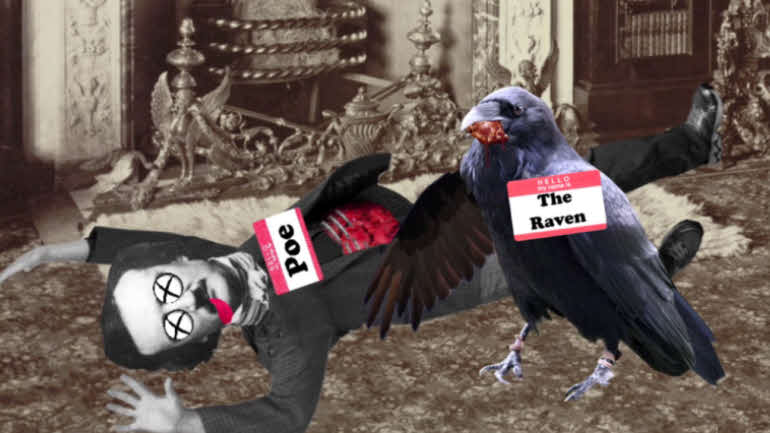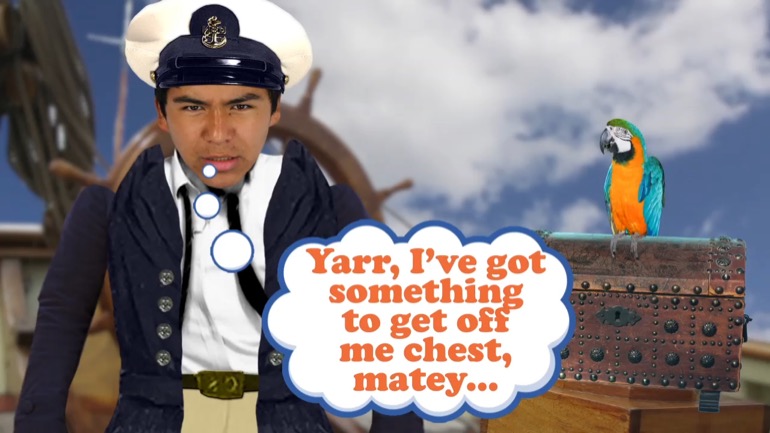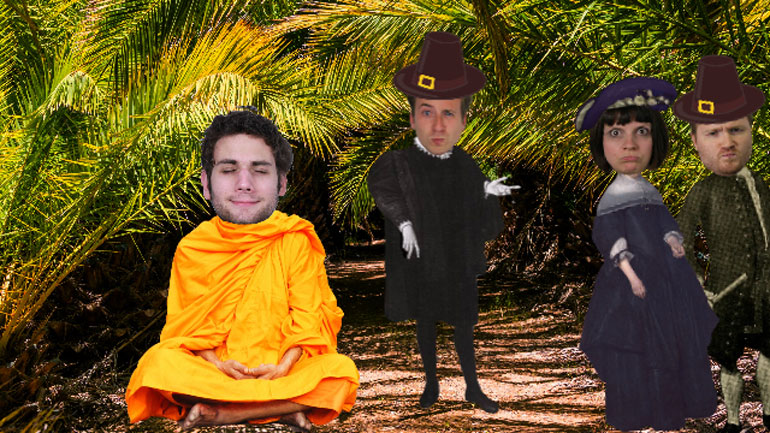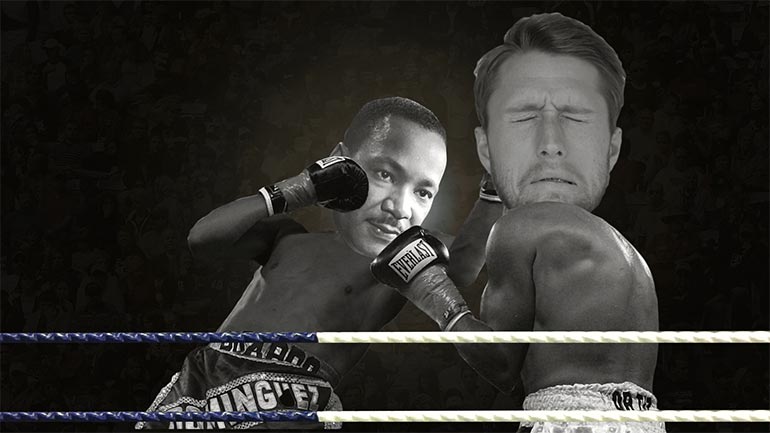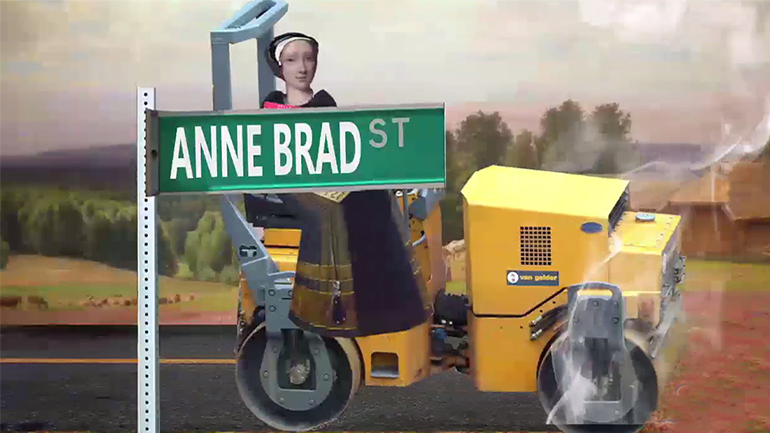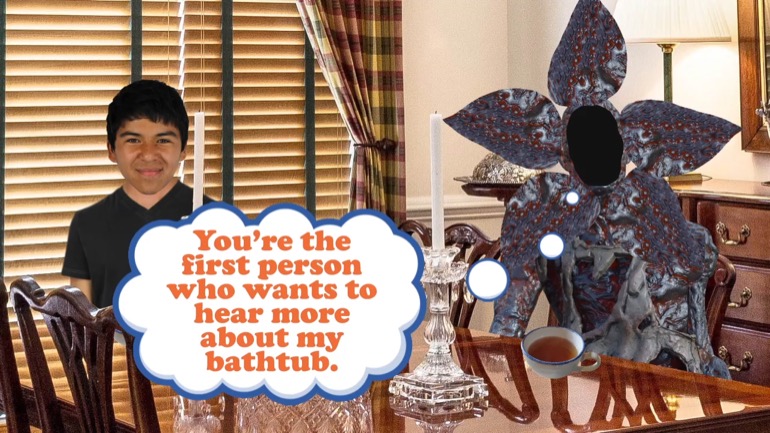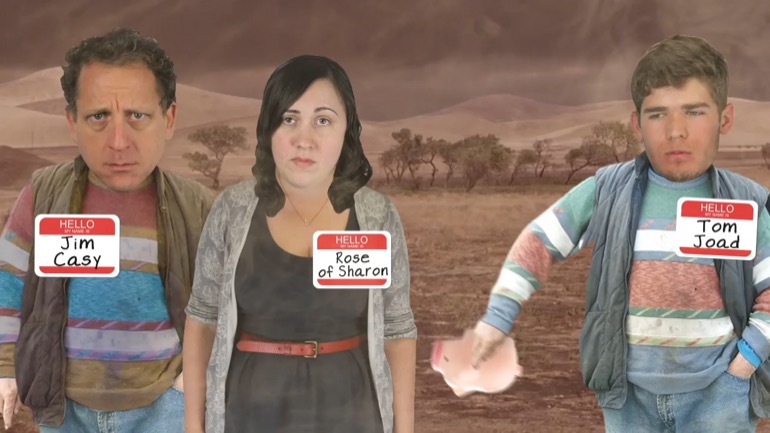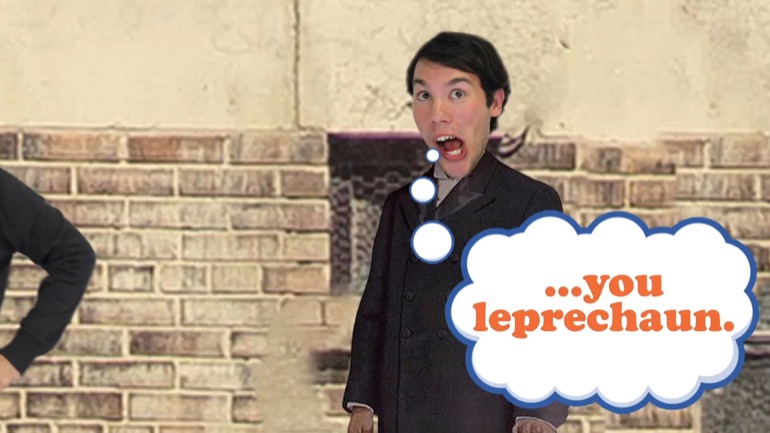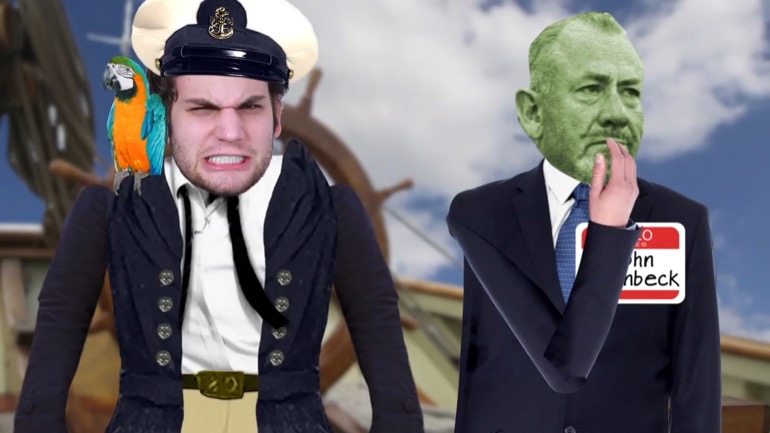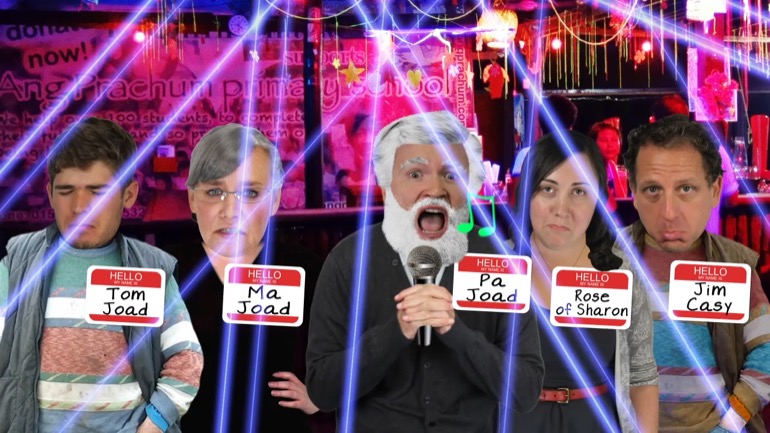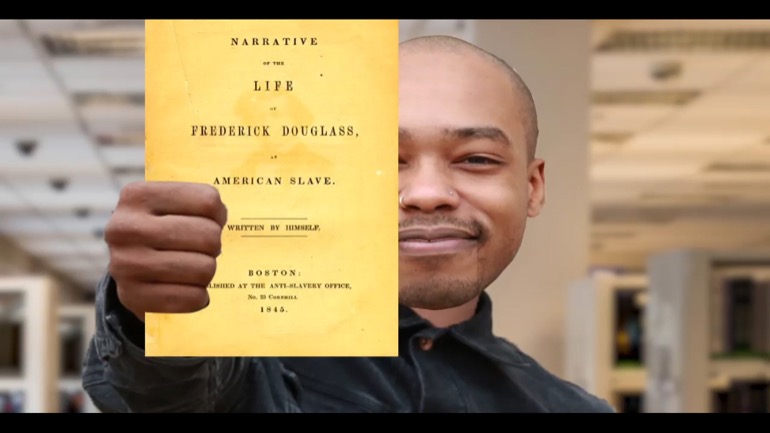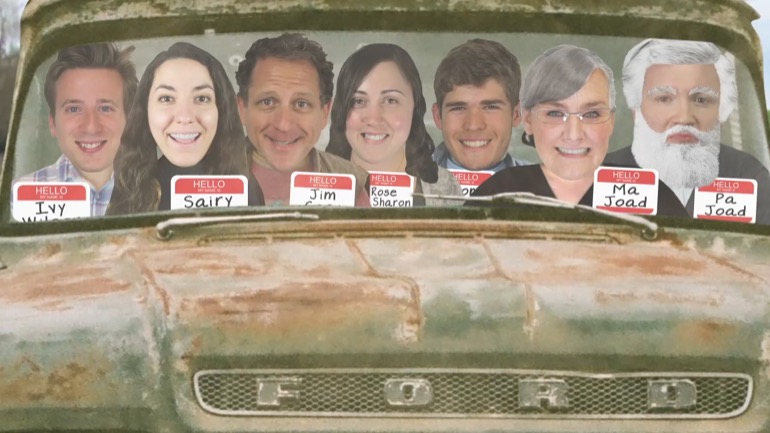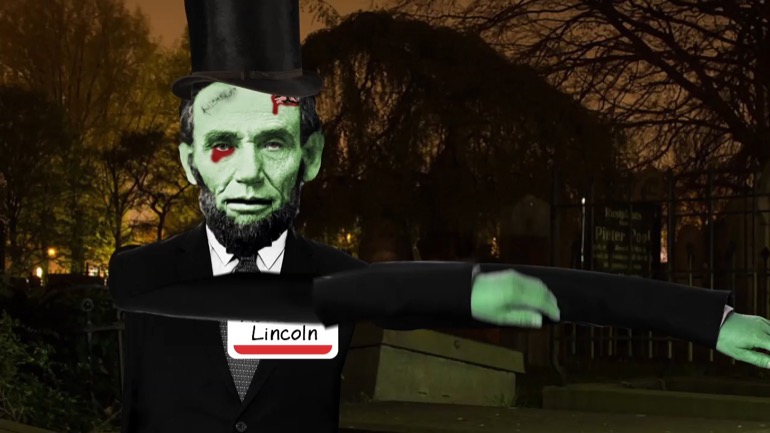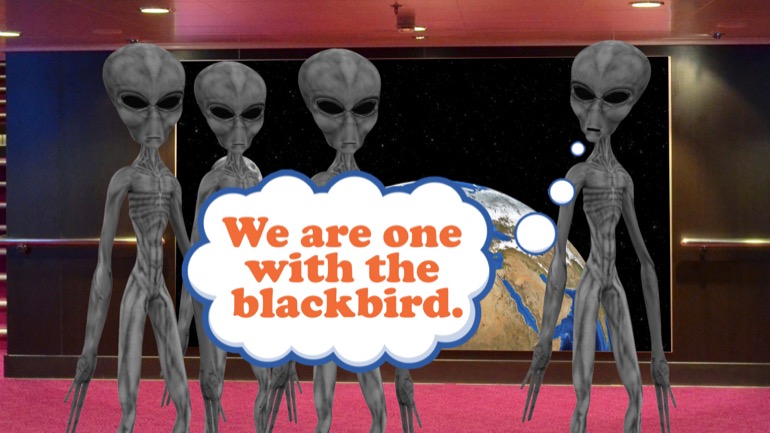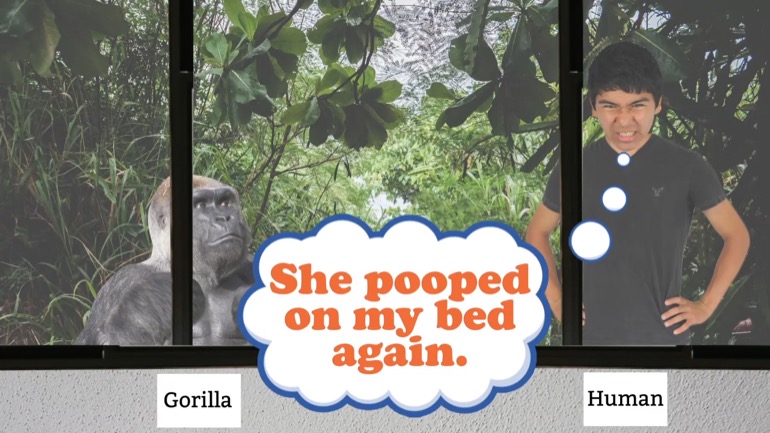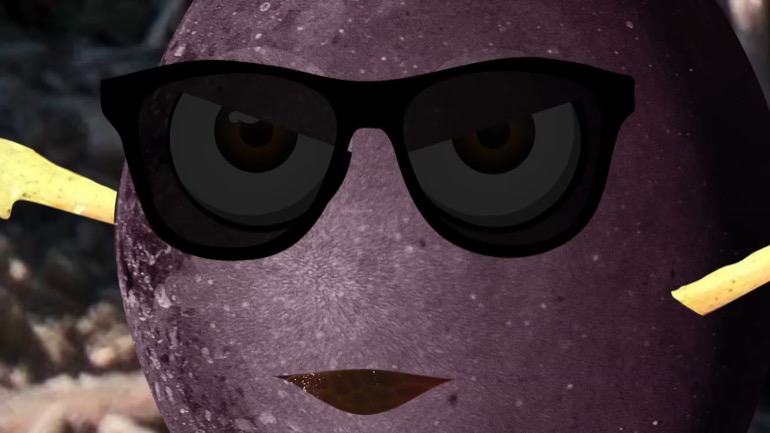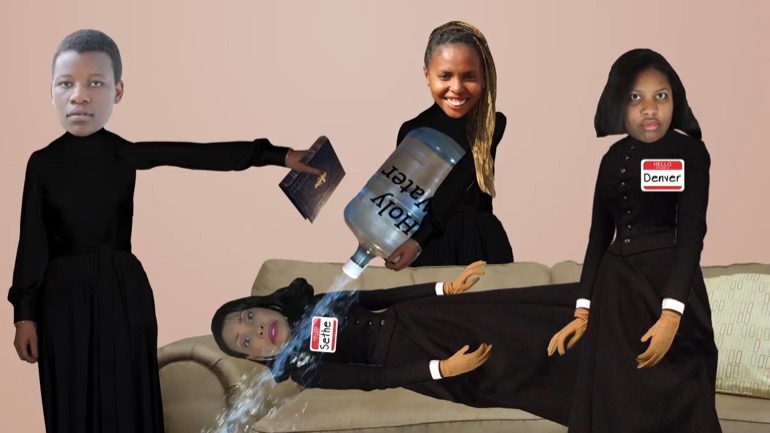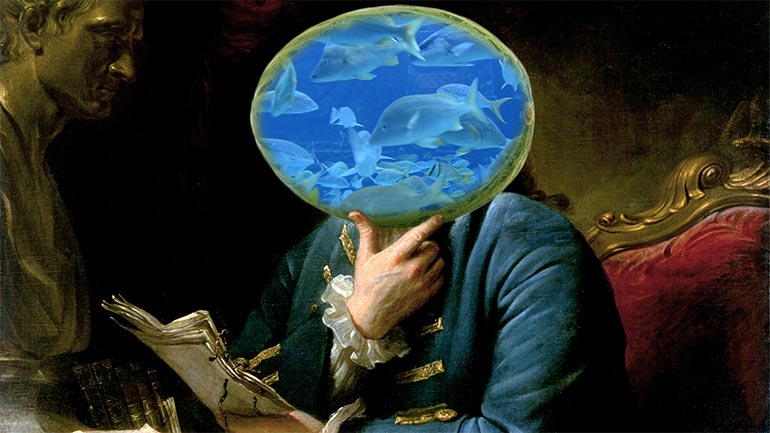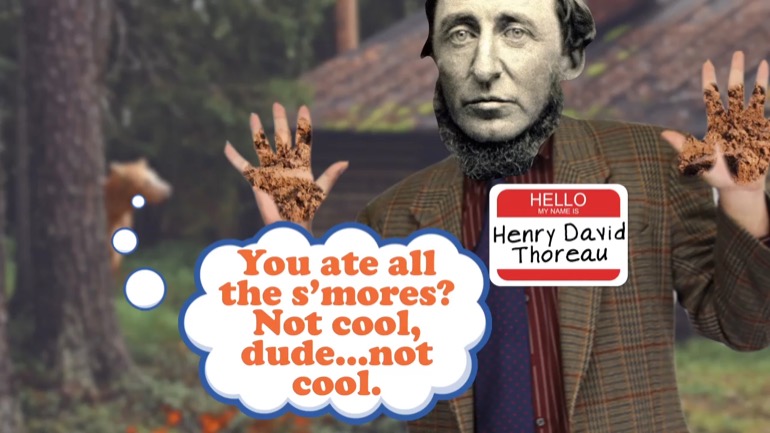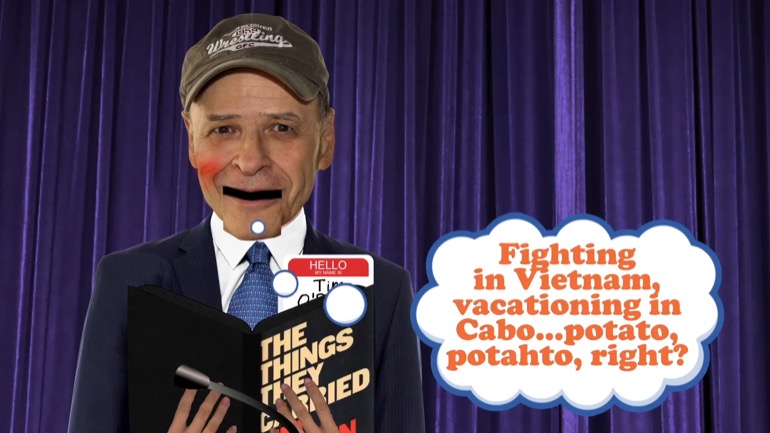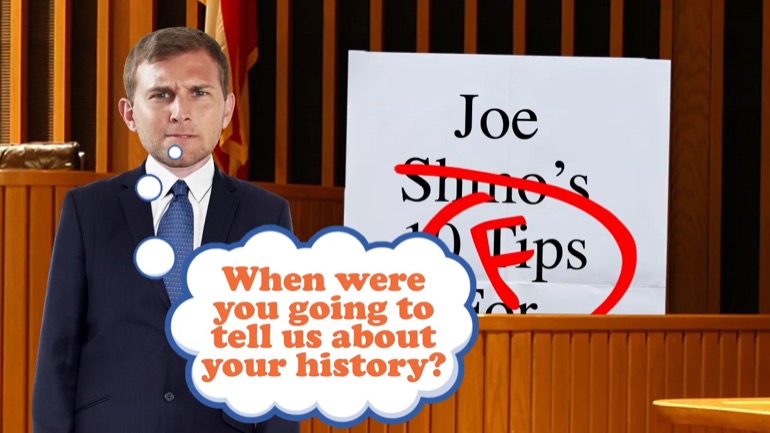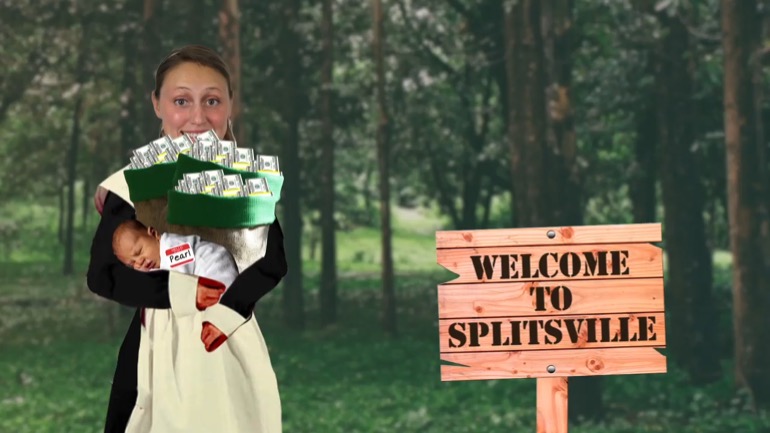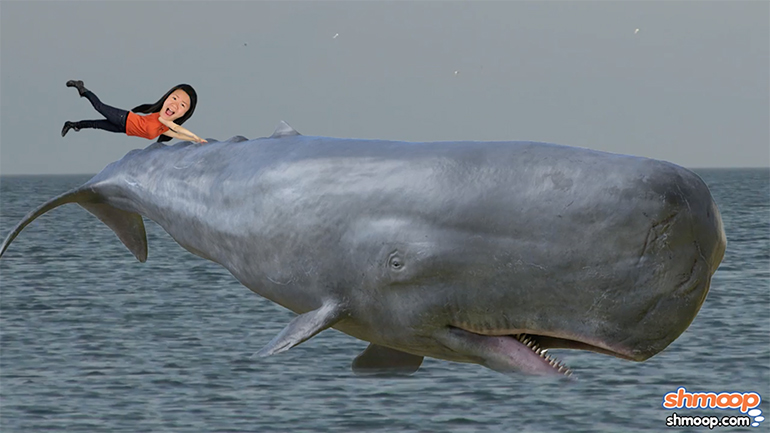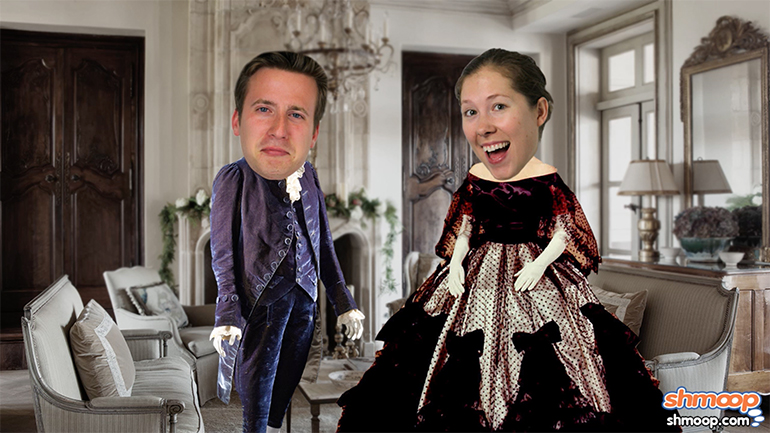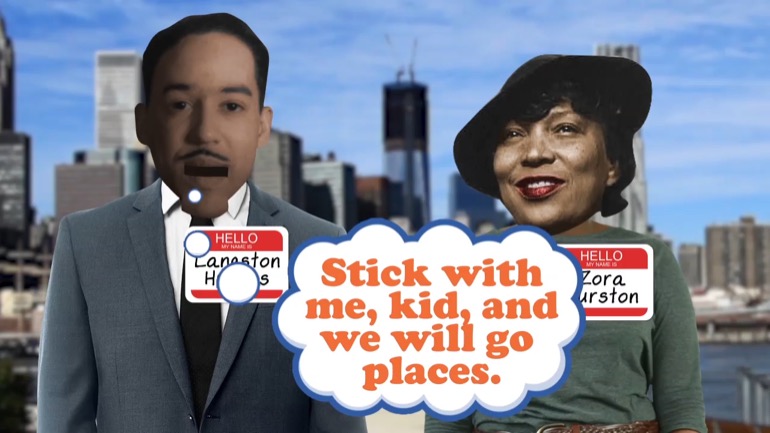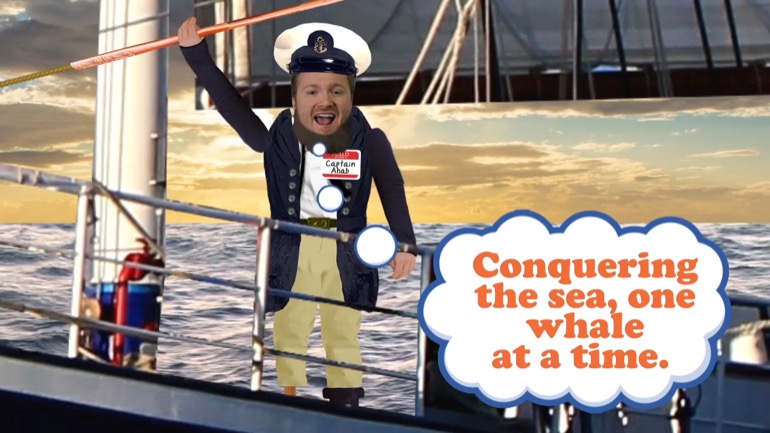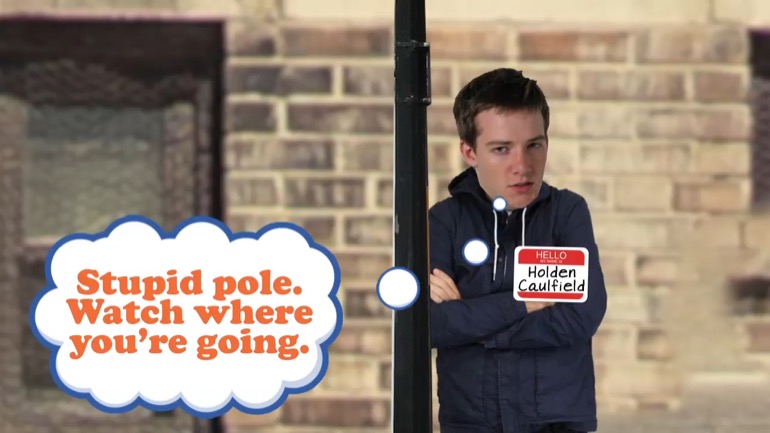ShmoopTube
Where Monty Python meets your 10th grade teacher.
Search Thousands of Shmoop Videos
Courses Videos 906 videos
How are risk and reward related? Take more risk, expect more reward. A lottery ticket might be worth a billion dollars, but if the odds are one in...
What's a dividend? At will, the board of directors can pay a dividend on common stock. Usually, that payout is some percentage less than 100 of ear...
What is bankruptcy? Deadbeats who can't pay their bills declare bankruptcy. Either they borrowed too much money, or the business fell apart. They t...
American Literature: The Things They Carried 11063 Views
Share It!
Description:
You know what you're going to carry away from this lesson on The Things They Carried? Knowledge. There's no better takeaway than knowledge...except for pizza, obviously.
Transcript
- 00:02
The Things They Carried.....
- 00:31
you know they always said I'd be
- 00:33
happy to be back home after the war but it's awfully boring just hanging around [Camouflage t-shirt talking]
- 00:37
like this fortunately I've been killing time by reading The Things They Carried
- 00:42
a 1990 short story collection by Tim O'Brien our author Tim O'Brien was born
Full Transcript
- 00:49
in Austin in 1946 no not Austin, Texas the hipster capital of the southeast but
- 00:55
Austin Minnesota the spam capital of the US for real they even have a spam Museum [A tin of Spam appears]
- 01:01
in 1968 while at Macalester College O'Brien was drafted into the United
- 01:05
States Army and sent to Vietnam he stayed in Vietnam until 1970 serving in
- 01:11
the same division that was involved in the horrendous milay massacre an
- 01:14
unprovoked attack in which American soldiers massacred hundreds of innocent [Innocent vietnamese civillians appear]
- 01:19
civilians upon completing his tour of duty O'Brien went to graduate school at
- 01:23
Harvard and got an internship at the Washington Post which was one of those
- 01:27
old tiny newspaper things from an active war zone to a coffee break room talk
- 01:32
about a jump in workplace safety standards
- 01:34
O'Brien began his writing career in earnest in 1973 with the publication of [Tim writing in an office]
- 01:39
if I die in a combat zone box me up and ship me home
- 01:42
a memoir which documents his tour in Vietnam and also easily wins our
- 01:47
semiannual way too wordy of a title award although O'Brien would write some
- 01:52
fiction over the years like the novel's going after cacciato and the nuclear age [O'Brien's novels appear]
- 01:57
it wasn't until 1990 that he released his next major book The Things They
- 02:01
Carried the things they carried isn't exactly an easy book to summarize
- 02:05
technically speaking it's a collection of short stories each chapter is its own
- 02:09
thing you could pick up any one of them and you'd have a [Person picks up The Things They Carried book]
- 02:12
a satisfying story from a beginning middle and end they're set in distinct time periods
- 02:16
both during O'Brien's tour in Vietnam and after it and they feature different
- 02:21
main characters each time around so O'Brien remains the narrator the
- 02:25
whole time despite the differences however each story also features the [US Soldiers in line]
- 02:29
same set of characters similar themes and even reference to same event sure
- 02:34
sounds novel ish right and we're not done yet the book is also semi
- 02:38
autobiographical it takes influence from its author's life there's a character
- 02:42
named O'Brien who just so happens to be a writer [O'Brien in army gear walking through jungle]
- 02:45
O'Brien even mentions his novel going after cacciato which he wrote in real
- 02:49
life the book also purposely messes with our heads with O'Brien explicitly
- 02:54
stating at several points that he's been lying to us throughout the book
- 02:58
The book follows the men of O'Brien squad Alpha Company first
- 03:03
lieutenant Jimmy cross, rat Kylie, Kiowa Mitchell Sanders, Norman Bakker, Ted
- 03:09
lavender the whole gang actually scratch that lavender dies almost immediately in [Lavendar falls to the floor]
- 03:14
the opening story O'Brien tells us exactly what the title of the novel means on
- 03:17
one hand he's referring to the physical things they carried by the soldiers like
- 03:21
medicine weaponry or even bags of M&Ms but the title also refers to the [Soldier wounded in a trench]
- 03:26
metaphorical things being carried by the men like guilt fear and indigestion one
- 03:32
big moment is when O'Brien kills a Vietnamese soldier assumedly his first
- 03:36
of the war in shock O'Brien tries to deduce the dead guy's life story
- 03:41
deciding that he was a former scholar a secret anti-communist and the host of a
- 03:45
surprisingly popular YouTube channel about miniature trains, O'Brien later
- 03:49
reveals that this incident was totally untrue he never killed anyone but will
- 03:53
discuss that issue more in a bit another big moment is the death of Kiowa a [Kiowa's headstone appears]
- 03:57
Native American soldier and close friend of O'Brien although again we're left
- 04:01
with the sense that O'Brien tales might be a bit tall if you catch my drift
- 04:05
O'Brien admits that he's changed details of Kiowas death when telling the story [Person writing and scribbles out sentence]
- 04:09
previously which naturally leads us to wonder if he's being entirely honest
- 04:13
with us here to this end the final story the lives of the dead completely shifts
- 04:18
gears focusing on O'Brien's childhood sweetheart Linda who tragically died at [Linda appears and falls to the ground]
- 04:22
her youth in the story O'Brien explained that he's found
- 04:26
way to keep Linda alive not by performing some bizarre magical ritual
- 04:30
but by telling stories about her by sharing stories about Linda the same way
- 04:35
that he shares stories about his former comrade O'Brien can keep them all alive
- 04:39
and well inside his head he can ensure that their memories aren't forgotten
- 04:44
so maybe O'Brien stories aren't 100 percent accurate but then again maybe
- 04:48
they're not meant to be instead they're simply a way for O'Brien to hold on to [O'Brien thinking about his comrades]
- 04:52
the many people he's lost along the way let's look at a few individual stories
- 04:57
starting with how to tell a true war story the story begins with the best
- 05:00
first line ever this is true as we've already discussed one of the major
- 05:06
themes of the things they carried is truth and how much O'Brien is willing to [Women stretching in a field]
- 05:10
bend it but here O'Brien is mostly concerned with what make a proper war
- 05:15
story.....
- 05:26
well it has to be filled with obscenity and evil not
- 05:28
to sound like the narrator of a horror movie it also has to be totally [T-shirt discussing chapter of O'Brien's novel]
- 05:31
depressing no good feels here and don't expect a war story to teach you any
- 05:36
lessons if a war story teaches you anything it's that you shouldn't expect
- 05:40
lessons from stories in other words a war story should be as hard as a [Tupac appears on stage]
- 05:45
gangster rap album notice too how O'Brien defined war stories in terms of
- 05:50
what they're not as we saw earlier a war story does not impart any moral lessons
- 05:55
never moral.....
- 06:03
but it also can't be believed....
- 06:07
nor can it be fully understood and
- 06:12
analyzed............and incomprehensible immoral unbelievable mess sounds of a frat party
- 06:21
and what's a good war story in O'Brien's eyes well most importantly it [Soldiers fires a rifle]
- 06:25
must capture the actual experience of being in war, rather than stretching
- 06:29
the truth to make the subjects seem especially heroic brave or noble we also
- 06:34
see a couple of examples of war stories to varying degrees of believability like
- 06:39
when a group of soldiers unleash their entire arsenal after hearing Vietnamese [Army tent appears and shots fired]
- 06:43
music in the middle of the night or when they randomly kill a baby water buffalo
- 06:47
or when a soldier accidentally blows himself up with his own smoke grenade [Smoke grenade explodes and Jimmy Cross appears]
- 06:51
none of those little stories are particularly meaty not a ton going on so
- 06:55
why does O'Brian tell them well remember his criteria for a good war story good
- 07:00
war stories are impossible to analyze these little tales meet the mark on
- 07:05
that count they lack any sort of moral lesson can't say we learn anything from
- 07:09
the murder of a water buffalo so check that sucker off the list and [Person ticks off item from good war story checklist]
- 07:14
finally they're depressing an accidental death a spontaneous shootout and animal
- 07:19
murder can't get more depressing than that also though it may be difficult for
- 07:23
us to pinpoint the exact meaning of these stories it's this difficulty that
- 07:27
makes them such good war stories in O'Brien's eyes to O'Brien war is chaotic [Soldiers fighting in a field]
- 07:33
brutal and often feels meaningless which is why war stories must have the same
- 07:38
qualities we learn this lesson another way when O'Brien tells us about his
- 07:42
buddy, Rat Kiley who wrote his heart staggeringly beautiful letter to
- 07:47
his sister of a fallen member of their crew and what happened does she write
- 07:51
back planning a meeting for when rat returns to America? start a torrid love
- 07:55
affair with him over World of Warcraft the answer is none of the above she did
- 08:00
nothing didn't make a peep O'Brien compares this sitch to how older women
- 08:04
come up to him after readings and ask him to talk about something else besides [Elderly woman approaches O'Brien]
- 08:08
war not understanding how important it is for him to continue sharing stories
- 08:12
of his lost friends like we discussed before it's his only way of keeping them
- 08:16
alive in both instances we see how civilians can't understand what veterans
- 08:21
have gone through even if they lost a family member in the
- 08:24
war like the woman rat writes the letter to the outro is maybe the most
- 08:28
interesting part of the story however [Outro chapter appears]
- 08:37
O'Brien basically admits that he
- 08:39
fabricates parts of his stories to get across the deeper truth he's trying to
- 08:43
convey in his mind it's less important whether he nails the facts and figures [Facts and figures sign falls off wall]
- 08:47
than whether he accurately conveys what it felt like to go through those
- 08:52
experiences just check out this closing paragraph......
- 09:03
some unusual things to compare
- 09:04
with war right the dawn mountains love sounds more like a romantic drama
- 09:09
than a war story but what O'Brien is actually saying is that his war [Woman throws glass of water into mans face]
- 09:13
experiences are subjective they're open to interpretation and personal
- 09:17
experience a war story simply shows the reader what it felt like to be there
- 09:21
what it felt like to march into unknown Mountains filled with enemy soldiers and
- 09:26
what it felt like to live in constant fear of tomorrow's battle so the marker [Soldier prone in a field reloads weapon]
- 09:31
of a good war story isn't that it conveys some citation heavy deeply
- 09:35
researched historical truth or packs in more explosions than a fast and furious
- 09:40
movie instead a good war story should make you experience all the suffering
- 09:44
and terror endured by soldiers every day while not forgetting the moments of
- 09:48
triumph and camaraderie that equally define O'Brien's time on the war front [Children helping soldiers with boxes]
- 09:52
next up let's check out speaking of courage in this chapter we hang out with
- 09:57
Norman Bowker on the fourth of July after he returns to America instead of
- 10:01
watching fireworks and downing hot dogs like he's at Coney Island, Bowker is
- 10:05
driving in circles around a lake alone he feels like he can't talk to anyone [Bowker driving a car by a lake]
- 10:10
since coming back to America even his dad
- 10:12
in fact Bowker wishes his pops was here right now so he could tell him about how
- 10:17
he almost earned a Silver Star for valor Alpha Company had been camping beside a
- 10:21
river called song tra bong when the river overflowed
- 10:24
but song tra bong isn't an ordinary river how do I put this lightly [Man pooping in a river]
- 10:28
it's where the local villagers poop sorry that wasn't light at all
- 10:33
some point Kiowa seems to get hit by something and begin sinking into the mud [Kiowa sinking into the mud]
- 10:38
Bowker tries to free his buddy for a while but has little success so he runs
- 10:42
turns around and never looks back leaving poor Kiowa to get stuck under
- 10:46
the quicksand and die this story touches on the isolation felt by soldiers who [Bowker sinking in mud and soldier appears with head in his hands]
- 10:51
return home from war... sure it's great to be able to go to work without having to
- 10:56
dodge bullets but there seems to be a feeling of emptiness shared by these
- 11:00
Vietnam vets upon their return to America nobody understands what war is
- 11:04
really like they know about the bad stuff sure but they don't understand the
- 11:08
feeling of camaraderie accomplishment and purpose that come along with all the
- 11:13
suffering and if Bowker tried to share his experiences with normal folks they
- 11:17
have no idea what he was talking about sort of like the old women who [Bowker discussing war with a waiter]
- 11:21
approached O'Brien after book readings or their fallen comrades sister who Rat
- 11:26
writes a letter to the other main idea of this story is right there in the
- 11:29
title courage, Bowker seems to think that his lack of courage caused Kiowa to die
- 11:34
even though there's no evidence to back up that notion like come on the guy was [Bowker running away and Kiowa sinking]
- 11:38
being consumed by a pool of quick sand that was also poop
- 11:41
there's no coming back from that but maybe this feeling that he's not
- 11:45
courageous enough is exactly what prevents Bowker from sharing his war
- 11:49
stories to his dad even though sharing his stories might be the exact thing
- 11:53
that could help him but hey O'Brien just told us to not interpret morals from
- 11:57
war stories so we'll follow his orders for now interestingly the next story
- 12:02
notes is all about the process of writing this one how Bowker had described this [Person holding envelope to O'Brien]
- 12:07
scene to O'Brien in a letter and how O'Brien had included it at first in his
- 12:12
novel going after cacciato but O'Brien changed key details characters and
- 12:17
events as his par for the course when writing a fictional account of a real
- 12:20
story but that nonsense isn't good enough for Bowker he wanted his story with
- 12:25
the muddy field Kiowa and hopefully Leonardo DiCaprio starring as himself in [Di Caprio as a soldier appears]
- 12:29
the eventual film adaptation 10 years later
- 12:32
O'Brien finally takes Bowker's advice and writes that story this story the one
- 12:37
we're reading right now well a story about writing a story we just read [Man reading a book]
- 12:41
O'Brien blowin minds like his name was David Blaine the final story we'll be
- 12:45
looking at is called good form sounds more like a chapter in a grammar
- 12:49
textbook than a war novel name aside this story's the M night Shyamalan twist
- 12:53
to the entire book you ready for it everything you read so far is a lie...
- 12:58
here's what's true O'Brien is indeed 43 a writer and a
- 13:02
veteran of the Vietnam War everything else not so much [Facts on Tim O'Brien appear]
- 13:05
to help us understand this concept O'Brien explains that there are two different
- 13:10
types of truth there's happening truth which is the
- 13:13
sort of truth that we normally think about the reality of a situation so they
- 13:17
happening truth is the most recent date you went on would be things you did on it [Man and woman sitting at a table on a date]
- 13:22
what movie you saw and what restaurant you went to and then there's story truth
- 13:26
which is the way that something felt even if that feeling doesn't entirely
- 13:30
match up with reality so the story truth of that date would be how it felt, maybe
- 13:35
you were so in love that the burgers tasted like filet mignon and the diet
- 13:39
Fanta like champagne it's at this point that O'Brien reveals that he never
- 13:44
actually killed that Vietnamese soldier he was talking about but instead simply [Vietnamese soldier falls to the ground and O'Brien appears]
- 13:48
saw someone else kill him, see the happening truth is that O'Brien saw a
- 13:53
crazy amount of death in Vietnam so much that he still can't entirely understand
- 13:58
what happened but the story truth is that O'Brien felt
- 14:01
responsible for that death to some degree which is why he creates a
- 14:05
fictional story in which he actually was responsible for one of those deaths by
- 14:09
embellishing personal details about the Vietnamese soldier that he didn't
- 14:13
actually know O'Brien is creating a story truth that he feels accurately [Soldiers aiming rifles in the bushes]
- 14:18
reflects how it felt to be on the war front we should also think about what
- 14:22
O'Brien means when he talks about form in literature form refers to the way in
- 14:27
which something is written O'Brien explains that narratives are simply a
- 14:31
method of distribution for him separate entirely from the things he's writing
- 14:36
about that are known as his content for O'Brien the content is the emotional [Young boy soldier appears]
- 14:40
aspects of war the stuff that's hard to define and convey think of narratives as
- 14:45
pizza delivery boxes sure the box is important to a degree but it's not as
- 14:49
important as the sweet sweet pizza on the inside the pizza in this case being
- 14:53
O'Brien's war experiences so we might now better understand why O'Brien plays [O'Brien holds cards up to his face]
- 14:59
so fast and loose with the fact it's the only way he can explain an
- 15:03
experience that seems even now to be unexplainable now that you've learned
- 15:07
all about the things they carried let's consider the nuggets of knowledge you'll [Man carrying nuggets]
- 15:11
carry away from this lesson well maybe you should think about how Tim O'Brien's
- 15:16
personal experience in the Vietnam War made him the perfect person to write
- 15:20
about the conflict for the masses not that he keeps things conventional or
- 15:24
anything The Things They Carried is a fascinating book that combines aspects
- 15:28
of a short story collection novel and memoir interestingly the things they
- 15:32
carried is quite ambiguous when it comes to war itself
- 15:36
O'Brien argues that we shouldn't view his stories as moral lessons of any sort
- 15:40
of course we can do a little interpretation while O'Brien clearly [Important information on O'Brien novel appears]
- 15:44
feels a strong sense of camaraderie with his fellow soldiers he ultimately sees
- 15:49
war as chaotic meaningless and well just lame...
- 15:53
finally the things they carried shows us how hard of a time Vietnam vets had
- 15:57
reintegrating with society a struggle likely shared by veterans of all stripes
- 16:01
and not to mention us uniforms too after all I used to be worn by a five-star [T-shirt talking about vietnam war]
- 16:06
general for patton sake now the best I have to hope for is to be bought by a
- 16:11
hippie with minimal body odor not a good sign....
Related Videos
“Happy Hunger Games!” Or not. Katniss’s Hunger Games experiences left a not-so-happy effect on her. This video will prompt you to ponder if...
Who's really the crazy one in One Flew Over the Cuckoo's Nest? Shmoop amongst yourselves.
Sure, Edgar Allan Poe was dark and moody and filled with teenage angst, but what else does he have in common with the Twilight series?
¿Por que es el 'Gran' Gatsby tan gran? ¿Porque de su nombre peculiar? ¿Porque de el misterio que le rodea? Se ha discutido esta pregunta por muc...
Would would the world be like without books? Ray Bradbury tackles that question—and many more— in Fahrenheit 451. Go ahead; read it on your Kin...



